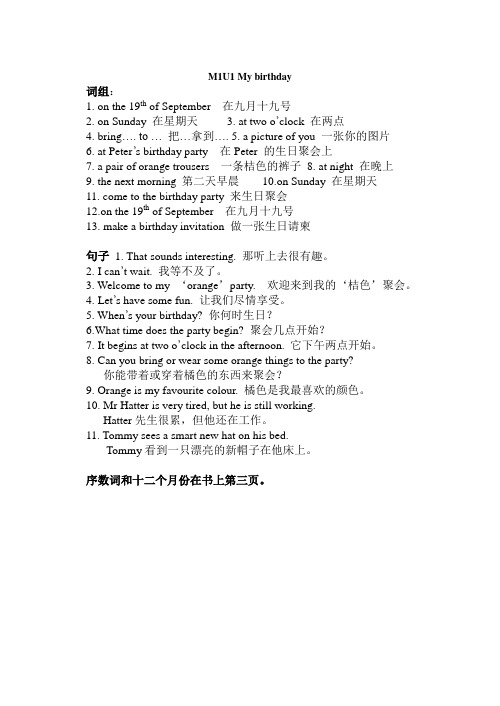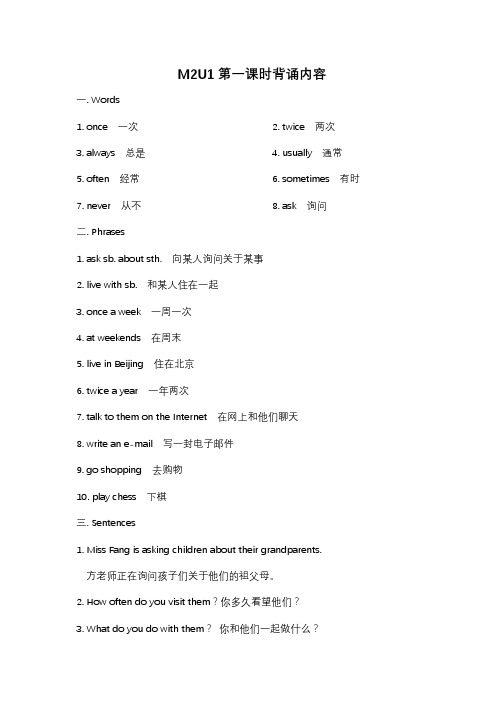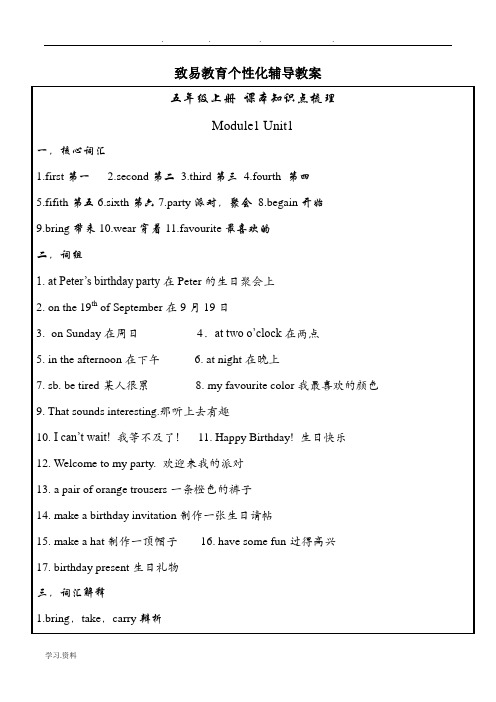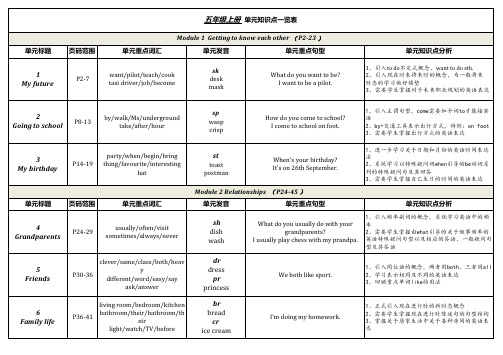沪教牛津版英语五年级英语上册 Module 1 知识清单
牛津上海版英语五年级上册 Unit 1 My birthday 知识点复习资料

Module 1 Unit 1 My birthdayI. 单词与词组1. begin /bi'gin/ v. 开始[第三人称单数]begins[现在分词]beginning[过去式]began[过去分词]begunbegin作不及物动词时,意为“开始;开始进行”。
[例句]The concert begins at 8 p.m. 音乐会晚上八点开始。
[拓展延伸]begin还可以作及物动词,意为“开始,着手;动手”,其后可接v-ing形式或动词不定式。
[例句]When do you begin learning English? 你什么时候开始学英语的?After breakfast it begins to snow. 早饭后开始下起雪来。
2. bring /brɪŋ/ v. 带来,拿来[第三人称单数]brings[现在分词]bringing[过去式]brought[过去分词]broughtbring在本单元意为“带来,拿来”,另外还有“使产生,引起,导致”的意思。
[例句]I bring my mother a glass of water. 我给妈妈拿来一杯水。
Please don't forget to bring your books next time. 下次请另忘记把你们的书带来。
[拓展延伸]bring和take的区别:bring意为“带来,拿来,取来”,指从别处把某人或某物带到或拿到说话者所在的地点来。
[例句]Why don't you bring him here? 你为什么不把他带到这儿来呢?My books are on the desk. Will you bring them here? 我的书在桌子上,你可以把它们拿到这儿来吗?take意为“带去,拿走”。
它和bring相反,指从说话者所在地把某人或某物带走或拿走。
bring←说话的地点→take[例句]We'll take the students to the park. 我们将带学生去公园。
牛津上海版英语五年级上学期 Unit1 Around the city 知识点复习资料

Module 3 Places and activitiesUnit 1 Around the cityI. Words 单词1. along / ə'lɔŋ/(1)作介词,意为“沿着;顺着”。
[例句]I was driving my car along a road. 我沿着马路开车。
(2)作副词,意为“向前,一起;带着(+ with),来到;去到”。
[例句]Come along with us. 跟我们一起去吧。
I'll be along in a minute. 我一会儿就来。
2. turn / tə:n/(1)作及物动词,意为“旋动.拧动;使转向;拐过,绕过”。
[例句]He turns the key in the lock.He turns his face to the wall. 他转过脸面向墙壁。
He turns the street corner. 他拐过街角。
(2)作不及物动词,意为“翻动,翻转(+ to);求助(+to);变化,改变( + into)”。
[例句]Let’s turn to page 8.I always turn to him for help. 我总是找他帮忙。
Water has turned into ice. 水已经结成了冰。
(3)作名词,意为“转弯”。
[例句]The car makes a left turn. 汽车向左转弯。
3. bank /bæŋk/(1)作名词,意为“银行”。
[例句]I keep my money in a bank. 我的钱存在一家银行里。
(2)作名词,意为“岸”。
[例句]They stood on the river bank to fish. 他们站在河岸边钓鱼。
4. cinema /'sɪnəmə/ n.电影院[例句]I often go to the cinema. 我经常去看电影。
Let's meet at the cinema. 让我们在电影院见面。
上海牛津五年级上词汇表M1U1

M1U1 My birthday词组:1. on the 19th of September 在九月十九号2. on Sunday 在星期天3. at two o’clock 在两点4. bring…. to …把…拿到….5. a picture of you 一张你的图片6. at Peter’s birthday party 在Peter 的生日聚会上7. a pair of orange trousers 一条桔色的裤子8. at night 在晚上9. the next morning 第二天早晨10.on Sunday 在星期天11. come to the birthday party 来生日聚会12.on the 19th of September 在九月十九号13. make a birthday invitation 做一张生日请柬句子 1. That sounds interesting. 那听上去很有趣。
2. I can’t wait. 我等不及了。
3. Welcome to my ‘orange’party. 欢迎来到我的‘桔色’聚会。
4. Let’s have some fun. 让我们尽情享受。
5. When’s your birthday? 你何时生日?6.What time does the party begin? 聚会几点开始?7. It begins at two o’clock in the afternoon. 它下午两点开始。
8. Can you bring or wear some orange things to the party?你能带着或穿着橘色的东西来聚会?9. Orange is my favourite colour. 橘色是我最喜欢的颜色。
10. Mr Hatter is very tired, but he is still working.Hatter先生很累,但他还在工作。
牛津上海版五年级上册英语 Unit1 Grandparents 知识点复习资料

Module 2 Unit 1 GrandparentsI. Words 单词1. write /rait/ v. 写[第三人称单数]writes[现在分词]writing[过去式]wrote[过去分词]written作及物动词,意为“写下,书写” “写(书等),编写(乐曲等)”等。
[例句]I am writing a letter. 我正在写一封信。
He wrote lots of poems in his life. 他一生中写了许多诗。
[拓展延伸]write还可以作不及物动词,意为“写;写字” “写信( + to)”。
[例句]This pen writes well. 这笔写起来很顺手。
She writes to her parents once a week. 她每周给父母写一封信。
2. play /plei/ v. 玩[第三人称单数]plays[现在分词]playing[过去式]played[过去分词]playedplay作及物动词,意为“同…比赛;玩(游戏等);打(球);踢(球);打(牌下(棋)”,在本单元是“下棋”的意思。
[例句] He plays football every weekend. 他每个周末都踢足球。
The children are playing doctors and nurses.孩子们在玩医生与护士的游戏。
[拓展延伸](1)此外,还有“演奏;弹奏;吹奏;放音”的意思。
[例句]The girl plays the piano every evening. 这个女孩每晚都弹钢琴。
(2) 特别注意:play后面接球类名词时,名词前不加冠词;接乐器名词时,名词前加定冠词the。
如:play football, play ping-pong, play the guitar, play the violin(3) play也作不及物动词,意为“玩耍;游戏;戏弄;玩弄(+with)”。
5A 牛津沪教版五年级上M2U1知识点(附默写纸)

一. Words1. once 一次2. twice 两次3. always 总是4. usually 通常5. often 经常6. sometimes 有时7. never 从不8. ask 询问二. Phrases1. ask sb. about sth. 向某人询问关于某事2. live with sb. 和某人住在一起3. once a week 一周一次4. at weekends 在周末5. live in Beijing 住在北京6. twice a year 一年两次7. talk to them on the Internet 在网上和他们聊天8. write an e-mail 写一封电子邮件9. go shopping 去购物10. play chess 下棋三. Sentences1. Miss Fang is asking children about their grandparents.方老师正在询问孩子们关于他们的祖父母。
2. How often do you visit them?你多久看望他们?3. What do you do with them?你和他们一起做什么?一. Words1. 一次_________________2. 两次_________________3. 总是_________________4. 通常_________________5. 经常_________________6. 有时_________________7. 从不_________________ 8. 询问_________________二. Phrases1. 向某人询问关于某事_________________________________2. 和某人住在一起_________________________________3. 一周一次_________________________________4. 在周末_________________________________5. 住在北京_________________________________6. 一年两次_________________________________7. 在网上和他们聊天_________________________________8. 写一封电子邮件_________________________________9. 去购物_________________________________10. 下棋_________________________________三. Sentences1. 方老师正在询问孩子们关于他们的祖父母。
沪教牛津英语五年级上册知识点归纳

M1U1 Can I do this?1. 用‘there’作为开头表示事实,例如:There’s the red man。
2. 用祈使句发指令。
例如:Cross! Go! Wait!3. 用祈使句的否定形式禁止他人做某事。
例如:Don’t Cross the road. Don’t smoke. Don’t make a noise.4. 用名词表达事物。
例如:The traffic light’s red.5. 用情态动词can征求允许。
例如:Can I go out , Mum?6. 用Here you are回答问题。
(给你)7. 用现在进行时表达正在进行的事情。
例如:They are going out。
8. 用一般现在时态表达简单的事实。
例如:They are on the train.9. 学习用which对定语提问。
例如:Which sign means ‘Don’t eat or drink’?(哪一个标志的意思是“禁止吃喝”)10. 用I’m sorry. 表达歉意。
11. 在否定句中用or代替and。
例如:Don’t eat or drink.M1U2 This is what I want1. 用What do you want ? 询问“你想要什么?”2. 用I want…表达要求。
例如:I want some paper.3. 学习用Here’s /Here are …表达“给你……”。
4. 用Thank you very much.表达感谢。
5. 用形容词修饰东西。
例如:a large Coke (一大罐可乐)6. 用情态动词can征求许可。
例如:Can I have some fish, please?7. 学习关于菜的名称。
例如:noodles、vegetablesM1U3 This is what I need1. 关于学习用品的单词。
例如:books。
2. 用’What do you need for school ?’询问“你上学需要什么?”3. 用We need …表达“我们需要……”。
上海牛津英语5年级上册 知识点梳理超全5A M1-M4

致易教育个性化辅导教案五年级上册课本知识点梳理Module1 Unit1一,核心词汇1.first第一2.second第二3.third第三4.fourth 第四5.fifith第五6.sixth第六7.party派对,聚会8.begain开始9.bring带来10.wear穿着11.favourite最喜欢的二,词组1. at Peter’s birthday party在Peter的生日聚会上2. on the 19th of September在9月19日3.on Sunday在周日4.at two o’clock在两点5. in the afternoon在下午6. at night在晚上7. sb. be tired某人很累8. my favourite color我最喜欢的颜色9. That sounds interesting.那听上去有趣10. I can’t wait!我等不及了!11. Happy Birthday! 生日快乐12. Welcome to my party. 欢迎来我的派对13. a pair of orange trousers一条橙色的裤子14. make a birthday invitation制作一张生日请帖15. make a hat制作一顶帽子16. have some fun过得高兴17. birthday present生日礼物三,词汇解释1.bring,take,carry辨析bring是指把人或物从别处带到说话人所在的地方。
例如:Bring me some water, please.请给我取点水来。
carry及物动词,“搬运,运送”,一般是指搬运较重的物品。
例如:carry a box on one’s shoulder扛着箱子carry a baby on one’s back背着孩子“携带,带”例如:Almost every teacher carries a watch.差不多每位教师都带着一只表。
沪教牛津版五年级上册单元知识点一览表

P8-13
by/walk/Ms/underground take/after/hour
sp wasp crisp
How do you come to school? I come to school on foot.
1、引入主谓句型,come需要加介词to才能接宾 语 2、by+交通工具表示出行方式,特例:on foot 3、需要学生掌握出行方式的英语表达
6 Family life
P36-41
living room/bedroom/kitchen bathroom/their/bathroom/th
eir light/watch/TV/before
br bread
cr ice cream
I'm doing my homework.
1、正式引入现在进行时的新时态概念 2、需要学生掌握现在进行时陈述句的句型结构 3、掌握关于居家生活中关于各种房间的英语表 达
单元发音
单元重点句型
单元知识点分析
sh dish wash
What do you usually do with your grandparents?
I usually play chess with my prandpa.
1、引入频率副词的概念,系统学习英语中的频 率 2、需要学生掌握由what引导的关于做事频率的 英语特殊疑问句型以及相应的答语、一般疑问句 型及其答语
单元标题
页码范围
单元重点词汇
7 At the beach
Байду номын сангаас
P46-51
beach/enjoy/collect/sea letter/put/know/year
- 1、下载文档前请自行甄别文档内容的完整性,平台不提供额外的编辑、内容补充、找答案等附加服务。
- 2、"仅部分预览"的文档,不可在线预览部分如存在完整性等问题,可反馈申请退款(可完整预览的文档不适用该条件!)。
- 3、如文档侵犯您的权益,请联系客服反馈,我们会尽快为您处理(人工客服工作时间:9:00-18:30)。
Module 1Getting to know each other
一、核心词汇
1.名词:future 将来;未来pilot 飞行员job 工作;职业singer 歌手lifeguard 救生员Ms 女士journey 旅程;旅行underground 地铁station 车站hour 小时party 聚会thing 东西;事物hat 帽子
2.动词:want 想要teach 教(课)fall 掉落;落下save 救;救助;节约
become 变成;变得walk 走;步行take 乘坐(交通工具);带领begin 开始bring 带
来
3.形容词:favorite 最喜欢的interesting 有趣的
4.介词:by(表示方式);靠近after 在……后
5.副词:when 什么时候
6.兼类词:cook 厨师;烹饪
7.短语:taxi driver 出租车司机(be) good at 擅长primary school 小学bus stop 公共汽车站by bus 乘公共汽车far from 离……远on foot 步行by bike 骑
自行车by car 乘小汽车get off 下车have fun 尽情玩
二、拓展词汇
1.名词:doctor 医生teacher 老师sky 天空subject 科目
2.月份名词:January (Jan.) 一月February(Feb.) 二月March(Mar.) 三月
April(Apr.) 四月May 五月June(Jun.) 六月July(Jul.) 七月August(Aug.) 八月September(Sept.) 九月October(Oct.) 十月November(Nov.) 十一月December(Dec.) 十二月
3.动词:help 帮助
4.短语:fly a plane 驾驶飞机be afraid of 害怕
三、核心句型
1.—What do you want to be? 你想要成为什么?
—I want to be a pilot. 我想要成为一名飞行员.
解读: 这是询问某人理想的句型及其回答.
举一反三: —What do you want to be?你想要成为什么?
—I want to be a teacher. 我想要成为一名老师.
2.I want to fly a plane in the sky. 我想要在天空中驾驶飞机.
解读: 这是描述某人想要做某事的句型.
举一反三: I want to have a picnic. 我想去野餐.
3.—How do you come to school?你是怎么来学校的?
—I come to school on foot. 我步行来学校.
解读: 这是询问某人出行方式的句型及其回答.
举一反三: —How do you come to the zoo? 你是怎么来动物园的?
—I come to the zoo by bike. 我骑自行车来动物园.
4.—When’s your birthday? 你的生日是什么时候?
—It’s on 26th September. 在九月二十六号.
解读: 这是询问某人生日是什么时候的句型及其回答.
举一反三: —When is Joe’s birthday? 乔的生日是什么时候?
—It’s on 2nd March. 在三月二号.
5.—Can you come to my birthday party, Joe? 你能来参加我的生日聚会吗,乔?
—Sure. 当然.
解读: 这是询问对方能否做某事的句型及其回答.
举一反三:—Can you come to my school?你能来我们学校吗?
—Sure. 当然.
6.—What time does the party begin? 聚会什么时候开始?
—It begins at two o’clock in the afternoon. 下午两点开始.
解读: 这是询问某活动开始时间的句型及其回答.
举一反三: —What time does the next class begin? 下一节课什么时候开始?
—It begins at 9:00 a.m. 上午九点开始.
7.Let’s have some fun! 让我们尽情地玩吧!
解读: 这是以let开头的祈使句.
举一反三: Let’s go shopping together! 让我们一起去购物吧!
四、了解句型
1.I want to help people. 我想要帮助人们.
解读: help 表示“帮助”,其后可跟名词、代词或动词不定式.
举一反三: She helps me to do the housework. 她帮助我做家务.
2.Who wants to fly a plane in the sky? 谁想要在天空中驾驶飞机?
解读: 这是询问谁想要做某事的句型.
举一反三: —Who wants to buy the book? 谁想要买这本书?
—Lily. 莉莉.
3.What subject does Alice want to teach? 爱丽丝想要教什么科目?
解读: 这是询问某人想要教什么科目的句型.
举一反三: —What subject does Lucy want to teach? 露西想要教什么科目?
—Maths.数学.
4. …, but he is afraid of flying. ……,但是他害怕飞行.
解读: 这是描述某人害怕做某事的句型.
举一反三:I’m afraid of walking in the dark. 我害怕走夜路.
5.Alice and I walk to school together. 爱丽丝与我一起步行来学校.
解读: 因为此句的主语是Alice and I,所以谓语动词用want.当第一人称与第三人称并列时,第三人称放在前面,第一人称放在后面,中间加and.
举一反三: Lucy and I want to go home. 露西与我想要回家.
6.What about you, Peter? 你呢,彼得?
解读: 这是征求某人意见的句型.
举一反三: I like apples. What about you? 我喜欢苹果.你呢?
7.There is an underground station near Ms Guo’s home. 在郭女士家附近有一个地铁站.
解读: 这是描述某地有某物的there be句型.
举一反三: There is a school near here. 这附近有所学校.
8.Welcome to my “orange party”. 欢迎来到我的“橘色聚会”.
解读: 这是表达欢迎某人来某地的句型.
举一反三: Welcome to our shop. 欢迎来到我们商店.
9.—What orange things do you have? 你们有什么橘色的东西吗?
—I have an orange hat.我有一顶橘色的帽子.
解读: 这是询问某人是否有某物的句型及其回答.
举一反三: —What book does he have? 他有什么书?
—He has a maths book.他有一本数学书.
10.Here are some orange things for you. 这些橘色的东西是给你们的. 解读: 这是由here引导的倒装句.
举一反三: Here is a book for you. 这本书是给你的.。
